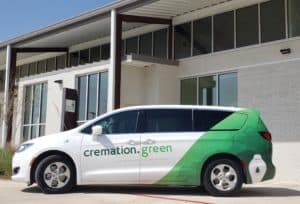The funeral industry is currently experiencing a notable shift. One of the biggest changes is the type of disposition options that are offered. Not long ago, most people had four options: traditional burial, natural burial, traditional flame cremation and direct flame cremation.
Concerns over the economical and ecological cost of traditional funeral services motivated innovative engineers to devise two more options: water cremation and natural organic reduction (NOR), also known as human composting. As with almost anything, people were a little hesitant to embrace the new concepts for disposition. And of course, there were special interest groups, like casket makers, with a vested interest in convincing people they needed to stick with the way things have always been done, even if it’s not the best financial or eco-conscious decision.
But all good ideas eventually catch on, and that’s what is happening with water cremation and human composting.
Why More People Are Gravitating to Human Composting and Water Cremation
A few years ago if you brought up the idea of water cremation or human composting, the vast majority of people would have had a similar knee-jerk reaction – revulsion. The naming conventions alone were part of the problem.
Today, a lot of people will have the same reaction, but many others won’t. Many people are now much more open to the idea of water cremation and NOR. And people aren’t just thinking about it. Market industry researchers like Emergen Research project huge growth in the green funeral market between now and 2030.
Why? Emergen notes emerging new technologies like natural organic reduction are one of the key factors at play. There are a few other primary reasons why more people are gravitating to human composting and water cremation.
Better Understanding of the Process
If people don’t understand something they are going to be very reluctant to adopt it. That is certainly the case with alternative forms of disposition like water cremation and human composting.
Green funeral advocates have put a significant amount of effort behind clearing up misconceptions about water cremation and human compositing. The mainstream media has also started to cover the topics more, helping to provide clarity to the masses about what is human composting and how does it work. As more people have begun to better understand the process, the reluctance is beginning to let up. If anything, as people learn about the benefits and safety of human composting and water cremation, they are more accepting of making the option available, even if they wouldn’t personally choose it.
Safety Concerns Connected to Other Forms of Disposition
Sometimes people go with an alternative because the current options aren’t ideal. That’s how more people are beginning to feel about traditional burial and cremation.
There are legitimate concerns over the safety of traditional funeral services, especially burial. Some of the concerns include:
- The use of toxic embalming fluid that poses a risk to funeral workers and the general public given that the fluid can leach into the ground.
- The use of land for burial plots, which is a conservation concern.
- The amount of resources needed for burial: 20 million feet of hardwood, 81,500 tons of metal and 1.6 million tons of concrete.
- The pollution created by sourcing all of the materials needed for burial.
- The air pollutants created by traditional flame cremation.
- The amount of nonrenewable fuel that’s needed to power traditional cremation retorts.
These are just some of the top concerns that many people share. There are a lot of other personal reasons for concern over traditional funeral services that extend beyond safety.
More Control and Less Reliance on a Funeral Home
A lot of people don’t want to have a somewhat impersonal memorial or viewing at a funeral home, but they feel like that is their only option. Many people also don’t like the fact that traditional services are heavily reliant on the funeral home at every stage, which also limits what you can do to honor a loved one.
While it is important to have assistance with all of the legal and regulatory requirements connected to death, water cremation and human composting in particular gives families more autonomy. With NOR the family can actually come by the facility to have a laying in memorial or just visit to check on things during the months-long process. Once the disposition is complete the family can choose to have a soil scattering ceremony if they opt to receive the compost material. Or the family can choose to donate the nutrient-rich soil to aid in conservation efforts.
At the end of the day, the family is in more control of the process and not completely beholden to the funeral home.
Why More State Governments Are Approving Water Cremation and Composting Human Remains
Once consumers get on board with an idea, that’s when businesses and government entities begin to take actionable steps. In the case of disposition, we’re now seeing more state governments approving water cremation and human composting in rapid succession. Government officials state the reasons noted above for the decision to consider alternative forms of disposition, even if they haven’t gotten mainstream buy-in yet. In actuality, once governments approve the practices it helps to reinforce public adoption.
Let’s use human composting as the example. States with the most disposition options have already approved human composting. Before 2019 no state had formally allowed human composting as a form of disposition. In just four short years that is definitely no longer the case.
States that have already approved human composting include:
- California
- Colorado
- Nevada
- New York
- Oregon
- Vermont
- Washington
States that are currently considering approval for human composting include:
- Connecticut
- Delaware
- Illinois
- Maine
- Maryland
- Massachusetts
- Minnesota
- New Jersey
- Pennsylvania
- Rhode Island
- Virginia
Just the fact that other states are approving the practice of natural organic reduction increases the likelihood that other states will follow suit. In Texas, legislation authorizing natural organic reduction and water cremation stalled out. However, efforts are already underway to introduce a new bill that would put Texas on par with other states that are giving residents more disposition options.
Cremation.Green has been invested in giving families in Texas more freedom to choose their own disposition. We work tirelessly with forward thinking lawmakers that are also motivated to improve the funeral industry so it is more consumer-focused.
If you’d like to know more about eco-friendly disposition options, including human composting and water cremation, the Cremation.Gree team can be reached by phone, text or email 24 hours a day.






